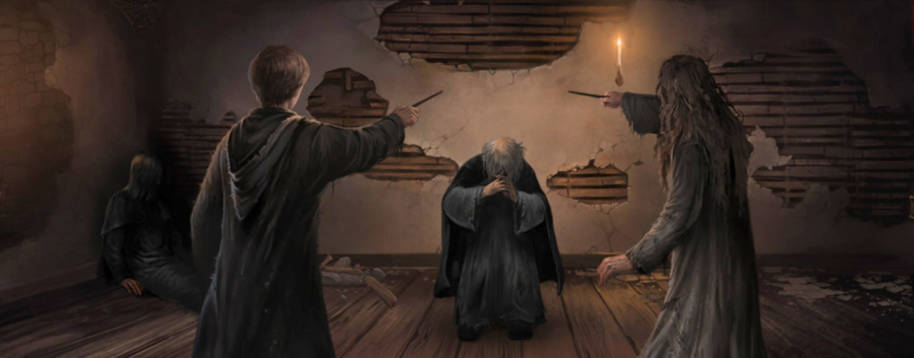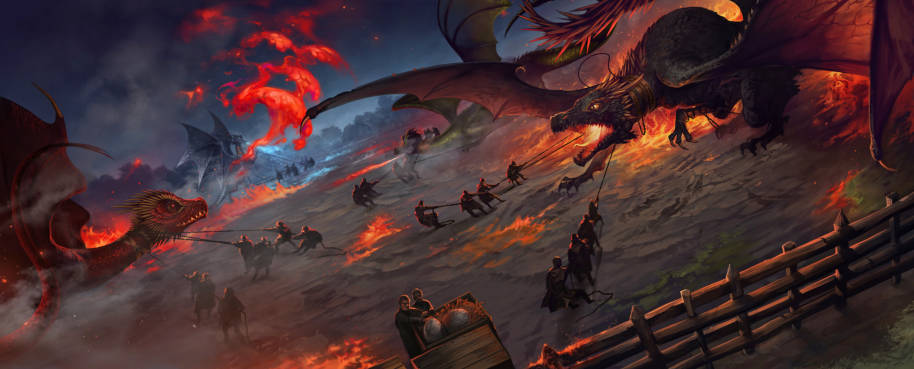
Perhaps it comes with having faced one of the world’s Darkest wizards before his second birthday, but Harry Potter has a very well-developed sense of justice. That his mother died to protect him from Voldemort has left more than the protection that lingers in Harry’s skin – it’s also left him with an acute awareness of right and wrong, even if those around him don’t always agree.
From that first ride on the Hogwarts Express to the moments after the final Triwizard task, here are some of Harry’s memorable moral moments:
When he refused Malfoy’s friendship
As soon as he meets the sneering, condescending Malfoy, Harry has a bad feeling about him. So when Malfoy turns up in the Hogwarts Express carriage Harry is sharing with Ron, warning Harry not to associate with the ‘wrong sort’, Harry’s reaction is instant. ‘I think I can tell who the wrong sort are for myself, thanks,’ he tells Malfoy, aligning himself firmly with Ron.
When he set off to retrieve the Philosopher’s Stone
When Harry, Ron and Hermione become convinced Snape wants to get his hands on the Philosopher’s Stone, they try to enlist the help of a couple of teachers. But Dumbledore’s away and McGonagall won’t listen, so Harry takes it upon himself to rescue the Stone. When Hermione and Ron try to dissuade him, he won’t budge, saying: ‘I’m going through that trapdoor tonight and nothing you two say is going to stop me!’ So they join him instead.
When he used the Mirror to get the Stone

Dumbledore’s first great Harry-shaped gamble becomes clear when Harry discovers Quirrell in front of the Mirror of Erised trying to get his hands on the Philosopher’s Stone. When Harry stands in front of the Mirror, like Quirrell he sees himself with the Stone – but in Harry’s case this vision comes true, because only a person who wants to find but not use the Stone can get their hands on it. At the age of 11, Harry displays exactly the kind of moral courage Dumbledore has banked on.
When he saved Justin Finch-Fletchley
When a snake conjured up by Malfoy seems about to attack Justin Finch-Fletchley at the end of their first Duelling Club in Chamber of Secrets, Harry unthinkingly speaks in Parseltongue, telling the snake to leave Justin alone. It works – at Harry’s words the snake falls docile. It’s just a shame nobody understands Parseltongue, a skill Harry shares with Voldemort and Salazar Slytherin, and therefore they all wrongly think Harry is egging the snake on.
When he followed the spiders
Hagrid’s instruction to ‘follow the spiders’ isn’t something Ron is keen on – it’s Harry who trusts in Hagrid’s instruction and insists they head to the Forbidden Forest. While encountering Aragog and his large family of monstrously huge spiders with a taste for eating people isn’t exactly a picnic, it is worth it for what Aragog tells them about the Chamber of Secrets.
When he freed Dobby

Dobby the house-elf’s attempts to keep Harry safe might be a bit, well, dangerous, but Harry knows his heart is in the right place. So when he sees a chance to free Dobby he takes it, tricking Lucius Malfoy into giving Dobby clothes and ending his servitude. This is despite the fact that Harry has just undertaken a gruelling fight with Voldemort-as-Tom-Riddle. He’s never too exhausted to ignore injustice.
When he thought he was being followed by a dog
After storming out of the Dursley’s house in Prisoner of Azkaban, Harry starts seeing a large black dog, seemingly everywhere. It begins to worry him when first Professor Trelawney and then Ron draw comparisons to the Grim, a death omen. Despite Ron’s concerns, Harry is convinced the dog is real and not just a figment of his imagination. When he discovers Sirius’s true identity – and his unregistered Animagus status – Harry is proved right.
When he stopped Lupin and Black killing Pettigrew

Peter Pettigrew’s eventual confession about betraying Harry’s parents is enough to make Remus and Sirius prepare to kill him. But Harry stops them, saying to Pettigrew, ‘I’m doing it because I don’t reckon my dad would have wanted his best friends to become killers – just for you.’ It’s a noble decision and one Harry later has cause to regret when Pettigrew escapes. But, as Dumbledore tells him, ‘The time may come when you will be very glad you saved Pettigrew’s life.’
When he resisted the Imperius Curse
In Harry’s fourth year, ‘Professor Moody’ – newly appointed Defence Against the Dark Arts teacher – takes the unusual step of demonstrating the three Unforgivable Curses: the killing curse, Avada Kedavra; the pain curse, Cruciatus; and the Imperius curse, used to control minds. Moody practises the Imperius curse on all his students, but only Harry attempts to fight it off, right from the first. Which, when you think about how Voldemort uses the Imperius Curse, shows how strong-willed Harry is.
When he told Cedric about the dragons

When Harry discovers the first Triwizard task is dragons, one of his first thoughts is to share that information with his fellow Hogwarts champion, Cedric Diggory. When he finds out Krum know as well, it becomes even more important. Harry doesn’t share the knowledge because he anticipates it being reciprocated, but his actions are rewarded when Cedric returns the favour ahead of the second task.
When he waited for all the hostages to be rescued
Harry’s moral fibre is really put on display during his second Triwizard task, when he refuses to leave the hostages under the lake until they have all been rescued. It means forfeiting the task, and it also means fighting the merpeople and rescuing Fleur’s sister. He realises later that he didn’t need to do this, but again, his actions are rewarded and he ends up tying with Cedric.
When he took Cedric’s body back
He would have tied with Cedric as the overall winner of the Triwizard Tournament, too, had Voldemort not used the moment to transport Harry and – by virtue of their mutual decision to take hold of the Cup together – Cedric to the graveyard where he is waiting. Voldemort’s first action is to kill Cedric; his second is to put Harry through a nightmarish experience that only ends when their wands meet and, once again, Voldemort is unable to kill Harry, instead unleashing a series of visions of his previous victims – including Cedric and Harry’s parents. After all that, Harry’s overriding thought is to abide by Cedric’s final wish and return his body to his parents.
Well done, Harry Potter for showing so much moral fibre in times of danger and difficulty! A Gryffindor through and through.


